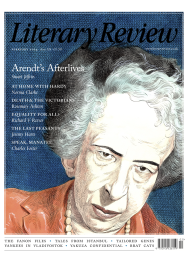Michael Taylor
The Long Road to Emancipation
The Reckoning: From the Second Slavery to Abolition, 1776–1888
By Robin Blackburn
Verso 544pp £35
Survivors: The Lost Stories of the Last Captives of the Atlantic Slave Trade
By Hannah Durkin
William Collins 432pp £25
In the 1830s, as abolitionists celebrated the emancipation of slaves in the British West Indies, the institution of chattel slavery was flourishing elsewhere in the American hemisphere. Driven by consumer demand for the staple crops of cotton, sugar and coffee, financed by banking houses who were content to accept the slaves themselves as collateral for loans to planters, and supplied by slave traders who persisted in their activities in spite of the Royal Navy’s policing, this was ‘the second slavery’. No longer a colonial imposition, it was a domestic development among independent or at least autonomous nations; it was a perversely dynamic and lucrative form of hell.
Robin Blackburn has long been a doyen among British scholars of enslavement, and two of his earlier works – on the making and then the overthrow of New World slavery – endure as authoritative textbooks in the field. Now, in The Reckoning, Blackburn tours the three major sites of the second slavery, explaining their rise and their eventual fall.
In the United States, the free-trading slaveholders of the southern plantocracy extended their peculiar institution into the lands of the Louisiana Purchase, the Mississippi basin and the plains of Texas. Leaving behind the tobacco plantations of the southeastern seaboard, they built a new kingdom of cotton; powered by Eli Whitney’s engines, it was the source of the materials through which Manchester, England’s Cottonopolis, grew wealthy. Although California entered the Union as a free state in 1850, and although Kansas bled over the issue, until the Civil War the senatorial strength of the southern Democrats enabled the South to preserve slavery.
Ninety miles beyond the Florida Keys lay the next great site of the second slavery. Cuba was one of the few Spanish colonies that withstood the Bolivarian (and frequently abolitionist) revolutions of the 1810s and 1820s, and the grand creole families of the island were quite aware of their increased

Sign Up to our newsletter
Receive free articles, highlights from the archive, news, details of prizes, and much more.@Lit_Review
Follow Literary Review on Twitter
Twitter Feed
Few writers have been so eagerly mythologised as Katherine Mansfield. The short, brilliant life, the doomed love affairs, the sickly genius have together blurred the woman behind the work.
Sophie Oliver looks to Mansfield's stories for answers.
Sophie Oliver - Restless Soul
Sophie Oliver: Restless Soul - Katherine Mansfield: A Hidden Life by Gerri Kimber
literaryreview.co.uk
Literary Review is seeking an editorial intern.
Though Jean-Michel Basquiat was a sensation in his lifetime, it was thirty years after his death that one of his pieces fetched a record price of $110.5 million.
Stephen Smith explores the artist's starry afterlife.
Stephen Smith - Paint Fast, Die Young
Stephen Smith: Paint Fast, Die Young - Jean-Michel Basquiat: The Making of an Icon by Doug Woodham
literaryreview.co.uk